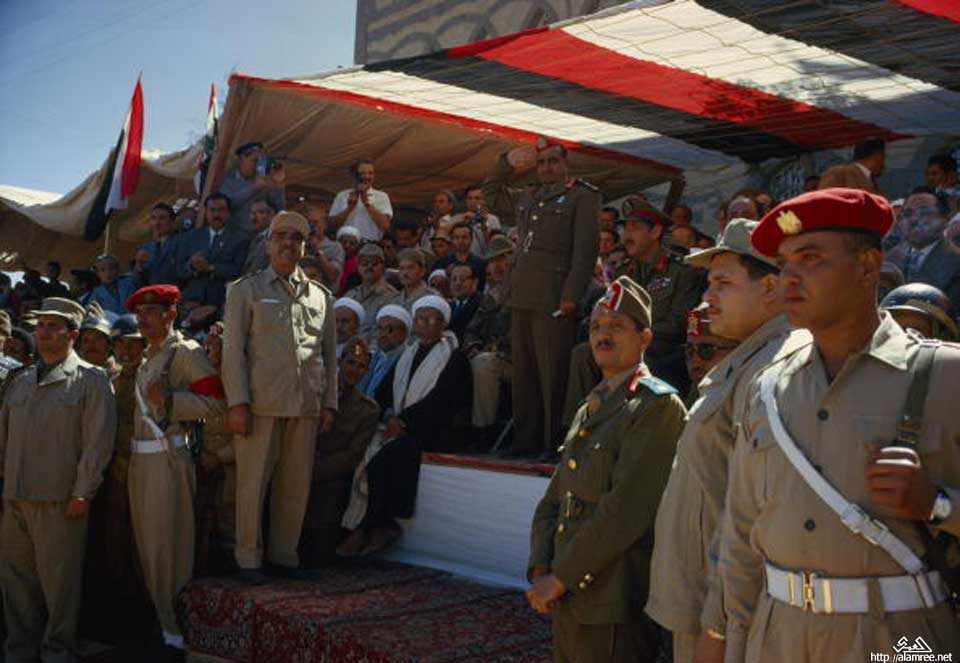Abdullah al-Sallal on:
[Wikipedia]
[Google]
[Amazon]
Abdullah Yahya al-Sallal ( ar, عبد الله يحيى السلال, ʿAbd Allāh Yaḥyā al-Sallāl; January 9, 1917 – March 5, 1994) was the leader of the North Yemeni Revolution of 1962. He served as the first
 Al-Sallal led the revolutionary forces that deposed King Muhammad al-Badr and brought the Mutawakkilite Kingdom of Yemen to an end. He presided over the newly founded
Al-Sallal led the revolutionary forces that deposed King Muhammad al-Badr and brought the Mutawakkilite Kingdom of Yemen to an end. He presided over the newly founded
President
President most commonly refers to:
*President (corporate title)
* President (education), a leader of a college or university
* President (government title)
President may also refer to:
Automobiles
* Nissan President, a 1966–2010 Japanese ...
of the Yemen Arab Republic
The Yemen Arab Republic (YAR; ar, الجمهورية العربية اليمنية '), also known simply as North Yemen or Yemen (Sanaʽa), was a country from 1962 to 1990 in the northwestern part of what is now Yemen.The United States extend ...
from 27 September 1962 to 5 November 1967.
Early life
Al-Sallal was born in the village of Sha'asan, Sanhan district. His father died when he was at a young age. Al-Sallal joined the only orphanage inSanaa
Sanaa ( ar, صَنْعَاء, ' , Yemeni Arabic: ; Old South Arabian: 𐩮𐩬𐩲𐩥 ''Ṣnʿw''), also spelled Sana'a or Sana, is the capital and largest city in Yemen and the centre of Sanaa Governorate. The city is not part of the Gover ...
, known as the Orphan School, which later became famous for raising many of Yemen's greatest patriots and some of the most influential politicians of that era.
In the late 1930s, he completed his military education in Baghdad, Iraq. He became a second lieutenant at this time.
Though not a member of the social elite in Yemen, Al-Sallal was widely respected by the military community as a competent and brazen officer despite being the son of a butcher, a profession looked down upon prior to the revolution.
Political career
 Al-Sallal led the revolutionary forces that deposed King Muhammad al-Badr and brought the Mutawakkilite Kingdom of Yemen to an end. He presided over the newly founded
Al-Sallal led the revolutionary forces that deposed King Muhammad al-Badr and brought the Mutawakkilite Kingdom of Yemen to an end. He presided over the newly founded Yemen Arab Republic
The Yemen Arab Republic (YAR; ar, الجمهورية العربية اليمنية '), also known simply as North Yemen or Yemen (Sanaʽa), was a country from 1962 to 1990 in the northwestern part of what is now Yemen.The United States extend ...
(YAR), with close ties to Gamal Abdel Nasser of Egypt
Egypt ( ar, مصر , ), officially the Arab Republic of Egypt, is a transcontinental country spanning the northeast corner of Africa and southwest corner of Asia via a land bridge formed by the Sinai Peninsula. It is bordered by the Medit ...
which served as the Yemen Arab Republic's strongest ally in the war
War is an intense armed conflict between states, governments, societies, or paramilitary groups such as mercenaries, insurgents, and militias. It is generally characterized by extreme violence, destruction, and mortality, using regular o ...
against the Saudi Arabia
Saudi Arabia, officially the Kingdom of Saudi Arabia (KSA), is a country in Western Asia. It covers the bulk of the Arabian Peninsula, and has a land area of about , making it the fifth-largest country in Asia, the second-largest in the A ...
n-backed Mutawakkilite royalists that lasted into 1970.
Yemen's President Abdullah al-Sallal negotiated with tribal leaders after the revolution to help cement the republic. He was later ousted in a bloodless coup led by Abdul Rahman Al-Iryani and exiled to Egypt, where he remained until President Ali Abdullah Saleh
Ali Abdullah Saleh al-Ahmar (, ''ʿAlī ʿAbdullāh Ṣāliḥ al-Aḥmar;'' 21 March 1947There is a dispute as to Saleh's date of birth, some saying that it was on 21 March 1942. See: However, by Saleh's own confession, he was born in 1947 al ...
invited him to return in the early 1980s.
Six different men held the position of Prime Minister
A prime minister, premier or chief of cabinet is the head of the cabinet and the leader of the ministers in the executive branch of government, often in a parliamentary or semi-presidential system. Under those systems, a prime minister i ...
under Al-Sallal, including Al-Sallal himself three times. He held both titles from the formation of the republic until 26 April 1963, when he appointed Abdul Latif Dayfallah, as well as briefly in 1965 and from 18 September 1966 until the end of his presidency. Abdul Rahman al-Eryani, al-Sallal's successor to the presidency in 1967, served as Prime Minister in 1963 and 1964. Hassan al-Amri held the post three times.
References
External links
* 1917 births 1994 deaths Field marshals People from Sanaa Presidents of North Yemen Prime Ministers of North Yemen Yemeni Arab nationalists Leaders ousted by a coup People of the North Yemen Civil War 20th-century Yemeni military personnel {{Yemen-politician-stub